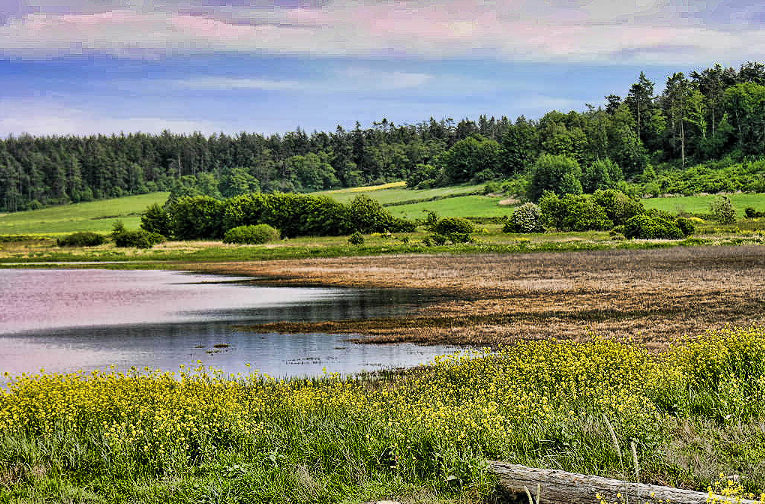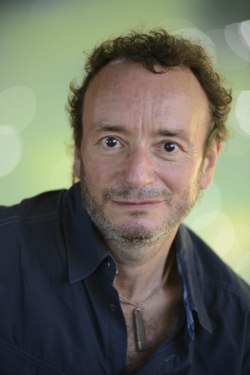Keynote talk given by Jeremy Lent to The Whidbey Institute annual gala, October 2020.
“When we truly open our hearts to each other, there is no burden too heavy for us to carry together, there is no pain too deep for us to hold in each other’s arms. And it’s in that place—of feeling the Earth’s injuries, and feeling it with each other—that the alchemy emerges. It’s in the cauldron of sharing our grief with our community, of gazing at it together and not looking away, that the heartbreak turns to hope.”
It’s so wonderful to hear Tyson (Yunkaporta, author of Sand Talk) talk about how we need to listen to natural law. It’s what our modern civilization needs to hear. I’m sure most of us share with Tyson the sense that our society has trampled on natural law; that we live in a world where indigenous knowledge, and the things that are most valuable to life are ignored, while those that are most destructive are valued the highest.
Speaking here from Northern California, we’ve been sharing with Tyson and his fellow Australians the grim experience of what happens when natural law is violated. It was less than a year ago that we were all horrified by the pictures coming out of Australia of apocalyptic wildfires—fires that were estimated to have killed a billion animals in the Outback. And it was just a month ago that those of us living here in the Bay Area woke up to our own vision of doomsday—a day without daylight, as the smoke from millions of acres of wildfires raging across the northwest settled over our skies, allowing nothing but a blood red glow to penetrate.
But of course, those of you here today don’t need these harbingers of doom to know that something is terribly wrong with where our world is headed. We all know, in spite of everything our media does to deflect our attention, that our global society is careening at an increasingly rapid rate toward the precipice. We know that people are suffering out there as a result of callous economic policies, that the onset of coronavirus has made that suffering even greater—and that increasing climate breakdown will only lead to deepening misery, with massive droughts and famines, and hundreds of millions of climate refugees forced to abandon their homes in desperation with no-one willing to receive them.
We know that the natural world is reeling from a relentless rampage of human exploitation. That the Amazon rainforest—the lungs of the Earth—is disappearing at the rate of more than an acre a second. The World Wildlife Fund recently reported that since 1970, animal populations worldwide have declined by 68%—and in Latin America, by a mind-boggling 94%. The richness of nature is getting virtually wiped out in our lifetime.
It’s impossible to face these realities head on without feeling your heart break. Speaking for myself, when I’ve contemplated this humanmade enormity, I’ve sometimes felt swallowed up into an infinite abyss of darkness. Is it any wonder that people turn away from facing these facts, that they see one of those frightening headlines warning about climate breakdown and they click anywhere but there, read their Facebook feed, check out the latest tweet, watch the report on this week’s political scandal? We live in a world designed to keep us numb—a culture spiked with incessant doses of spiritual anesthesia conditioning us to deaden our feelings, and adapt to the daily grind.
But it’s that very heartbreak that can free us from the consensus trance that our society imposes on us. The realization of our true nature, and the agony of life’s destruction at the hands of this civilization, are two sides of the same coin. That’s because, when we awaken to our true nature as humans on this beautiful but fragile Earth, when we feel the life within ourselves that we share with all other beings, then we recognize our common identity with all of life. We live into what Thích Nhât Hanh calls our interbeing.
And as we open awareness to our interbeing, our ecological self, we experience ourselves, in the words of Albert Schweitzer, as “life that wills to live in the midst of life that wills to live.” And then, we realize the deep purpose of our existence on Earth is to tend its living system, to tend Gaia, and participate fully in its ancient, sacred unfolding of vibrant beauty. And when we see the relentless way that beauty is being eviscerated, Gaia’s pain becomes our pain. It’s not just happening in the forests and the deep oceans, it’s happening to us—to our own ecological interbeing. As Thích Nhât Hanh puts it, we “hear within us the sounds of the Earth crying.”
But that pain of the Earth crying . . . it’s too much for any one of us to hold by ourselves. And that’s where we need to turn to another equally important dimension of our interbeing: our shared community of caring. When we truly open our hearts to each other, there is no burden too heavy for us to carry together, there is no pain too deep for us to hold in each other’s arms.
And it’s in that place—of feeling the Earth’s injuries, and feeling it with each other—that the alchemy emerges. It’s in the cauldron of sharing our grief with our community, of gazing at it together and not looking away, that the heartbreak turns to hope.
But let’s be clear what I’m talking about when I use the word “hope.” I’m not talking about the odds we might give for the likelihood of a positive outcome. Hope is not optimism. It’s something completely different. Rather than a prognostication, it’s an attitude of active engagement in co-creating our future. In the words of Václav Havel it’s a “deep orientation of the human soul that can be held at the darkest times . . . an ability to work for something because it is good, not just because it stands a chance to succeed.”
“To work for something, just because it is good.” This kind of hope is itself a transformation: from a noun to a verb. The alchemy takes place when we feel the heartbreak, with our community, so thoroughly within ourselves that there is nothing else to do but get engaged. Just like, when you feel physical pain in your body, you are moved reflexively to do something about it, so when we feel the Earth’s pain throughout our being, we are naturally moved to action. Because true knowledge isn’t just an intellectual idea, it’s something that infuses our entire body. One of the great sages of Chinese thought, Wang Yangming, made this crystal clear when he said: “There have never been people who know but do not act. Those who are supposed to know but do not act simply do not yet know.”
And something I’m sure about is that everyone here today is drawn to the Whidbey Institute because you do know, and you are impelled to action. And there is so much we can be doing to participate in the Great Transformation our global society needs to move from its current self-destructive path to one that offers a brighter future. It’s not just a matter of fixing a few things. Our civilization needs to be transformed at the deepest levels. We need to move from our current wealth-based society that’s been built on exploitation, on seeing people and the natural world as mere resources, to one that, like Tyson said, is based on natural law—an ecological civilization. What’s required is a metamorphosis of virtually every aspect of the human experience, including our values, our goals, and our daily norms.
Sounds like a tall order? I’m sure, when a dozen or so Quakers gathered in London in 1785 to create a movement to abolish slavery, people told them “Impossible! Our economy is based on it.” Within half a century, slavery was abolished throughout the British Empire. When Emmeline Pankhurst founded the National Union for Women’s Suffrage in 1897, it took ten years of struggle to muster a few thousand courageous women to join her on a march in London—but within a couple of decades, women were gaining the right to vote across the world. There is a crucial lesson to learn from these, and other, examples—like all self-organized, adaptive systems, society changes in nonlinear and unexpected ways. And oftentimes, the change is catalyzed by just a few, visionary souls working together against the odds—because they know what they’re doing is right.
We may not know what the future holds for humanity, but we do know that every day of our lives, we can choose to live into the future we wish for ourselves and for the rest of life. And just like the mycorrhizal underground network in the forest that trees use to support each other, when we connect with each other, we’re part of a powerful network that’s accomplishing something very different than what we may read about in the daily headlines.
Keep in mind that, as the current system begins to unravel on account of its internal failings, the strands that kept the old system tightly interconnected also get loosened. The old story is losing its hold on the collective consciousness of humanity. As waves of young people come of age, they are increasingly rejecting what their parents’ generation told them. They are looking about for a new way to make sense of the current unraveling, for a story that offers them a future they can believe in.
That is the great work that I believe the Whidbey Institute, and many of you present here today, are engaged in. Creating that new story, and living into it, is the alchemy of heartbreak and hope that we are generating together. And I, for one, am excited to be a part of this epic moment when we, together, can participate in co-creating the possibility of humanity’s flourishing future on a regenerated Earth.
Teaser photo credit: By Seabix – Own work, CC BY-SA 4.0, https://commons.wikimedia.org/w/index.php?curid=65600662






